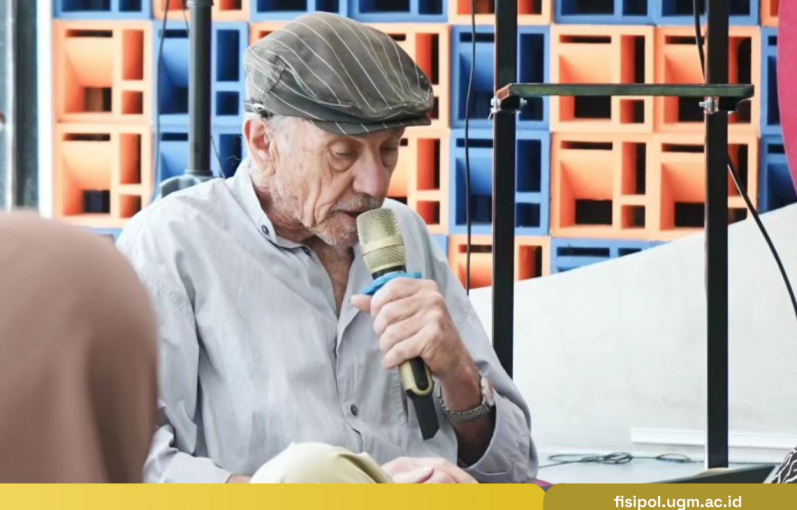
Yogyakarta, August 5th 2024─In an effort to dissect problems and find solutions regarding food security, the Department of Social Development Talks (SODET) organized the 67th Anniversary Special Edition of Social Development Talks. This special edition of SODET carries the theme “Discussion on Agriculture and Food: Realizing Food Security for a Prosperous Society”. The discussion was held offline at BRIWork Fisipol UGM on Monday (5/8) and was attended by various academics and agricultural practitioners.
Thomas Reuter, an Australian anthropologist, opened the discussion with his thoughts on the link between social systems and food systems. He believes that the food system cannot be separated from the culture and social system of the community. “The culture of the surrounding community will greatly affect how the food production process, for example, no one grows wheat in Indonesia, right?” he explained.
In addition, he also highlighted the food security challenges faced by the world today. Such as increasing demand for food, climate change, and unequal distribution. He also emphasized the mistakes of the green revolution during the New Order era which ultimately sacrificed the present. “What happened in the past such as the green revolution that increased agricultural yields by means of drugs for plants (chemical fertilizers and other chemicals) caused a decrease in soil productivity,” he explained.
Through his research with Graeme McRae, a fellow Australian anthropologist, he found that non-industrialized small farmers are one of the answers to this problem. Thomas and Graeme believe that large-scale agriculture ultimately tends to damage the environment and is purely capitalist. Instead, small-scale farmers using culturally appropriate methods are more appropriate and capable of meeting most of the world’s food needs while maintaining a sustainable environment. “Large food industries are not proven to be able to meet food needs, but small farmers with small resources are proven to be able to meet food needs with fewer negative effects,” said Graeme.
In line with this, TO Suprapto, Founder of Joglo Tani, expressed his reflection on agricultural practices that have been carried out. According to him, food security and agriculture itself are closely related to culture. Therefore, the agricultural practices at Joglo Tani emphasize the farming philosophy of how cultural understanding becomes the identity of the Joglo Tani people who are carried out on a daily basis with full awareness. “Culture is the pillar of change in mindset and behavior to manage food,” he said.
He also believes that farmers should not stop at food security. According to him, there are two more levels that should be pursued, namely food independence and food sovereignty. “Talking about food security, it is only important that there is food whether bought or assisted, if food independence means that it is actively productive even though seeds and fertilizers are still bought, even better is food sovereignty which means that farmers are active, innovative, creative and sovereign from start to finish,” he explained.
Matahari Farransahat, a PSdK lecturer, then also expressed his concern about the lack of motivation of the younger generation to become farmers. He believes that one of the reasons is the image of being a farmer that is less promising and unpleasant. “Currently, the most important thing is to create the passion of the younger generation to become farmers who also pay attention to moral ecology,” he said.
In closing, TO Suprapto conveyed his recommendations for solutions to overcome the various solutions that had been discussed. “There are six pressures faced by farmers today, namely economic, natural, social, cultural, global and policy pressures,” he explained. He believes that by eliminating these pressures, farmers’ lives will be better and food sovereignty can be achieved.
With these various discussions, it is hoped that the sustainable development goals of point 2 no hunger, point 10 reduced inequality, point 12 responsible consumption and production, point 13 addressing climate change, and point 15 terrestrial ecosystems.
